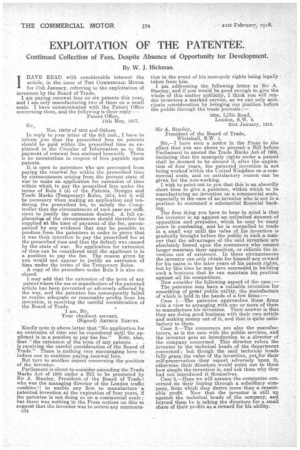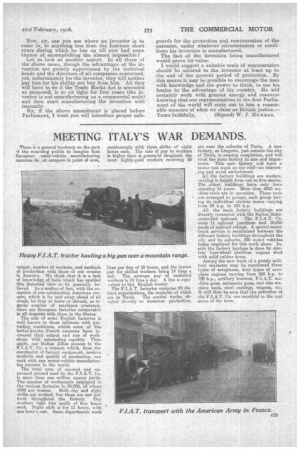EXPLOITATION OF THE PATENTEE.
Page 12

Page 13

If you've noticed an error in this article please click here to report it so we can fix it.
Continued Collection of Fees, Despite Absence of Opportunity for Development. By W. J. Hickman.
IHAVE READ with considerable Interest the article, in the issue of THE COMMERCIAL MOTOR for 17th January, referring to the exploitation of inventors by the Board of Trade.
I am paying renewal fees on six patents this year and I am only manufacturing two of them on a stnall scale. I have communicated with the Patent Office concerning them, and the following is their reply :— Patent Office,
11th May, 1917. Sir, Nos. 16076 of 1913 and Others
In reply to your letter of the 9tli inst., I have to inform you that the prescribed fees on patents should be paid within the prescribed time as explained in the Circular of Information as to the payment of renewal fees enclosed herewith. There is no moratorium in respect of fees payable upon patents.
it is open to patentees who are prevented from paying the renewal fee within the prescribed time by circumstances arising from the present state of war to make an application for extension of time within which to pay the prescribed fees under the terms of Ride 3 (a) of the Patents, Designs and Trade Marks (Temporary) Rules, 1914, but it will be necessary when making an application and tendering the prescribed fee, to satisfy the Comptroller that the circumstances of such ease are sufficient to justify the extension desired. A full explanatiou of the circumstances should therefore be supplied at the time of payment of the fee, accompanied by any evidence that may be possible to produce from the patentees in order to prove that it was their intention to pay the prescribed fee at the prescribed time and that the default was caused by the state of war. No application for extension of time can be considered until the• applicant is in a position to pay the fee. The reason given by you would not appear to justify an extension of time under the terms of the Temporary Rules.
A copy of the procedure under Rule 3 is also en
closed. _
I may add that the extension of the term of any patent where the use or manufacture of the patented article has been prevented or adversely affected by the war, and the patentee has consequently failed to realize adequate or reasonable profits from his invention, is receiving the careful consideration of
the Board of Trade. v I am, Sir, Your obedient servant, (Signed) ARTHUR NERVES. .
Kindly note in above letter that "No application for an extensien of time can be considered until the appliemt is in a position to pay the fee." Note, also, that "the extension a the term of any patents. . . is receiving the careful consideration of the Board of Trade." There is nothing very encouraging here to induce one to continue paying renewal fees.
But turn to another aspect concerning the position of the inventor.
Parliament is about to consider amending the Trade Marks Act of 1905 under a Bill to be presented by Sir A. Stanley, President of the Board of Trade! who was the managing director of the London traffic combine !! to enable any firm to manufacture' a patented invention at the expiration of four years, if the patentee is not doing so on a. commercial scale • but there was nothing in the Press notices on this .1.:'• suggett that the inventor was to secure any remunera c34 tion in the event of his monopoly rights being legally' taken from him.
I am . addressing the following letter to Sir A.
Stanley, and if you would be good enough to give the whole-of this matter publicity, I think you will render inventors a marked service, as we can only anticipate consideration by bringing our Pesition before the public through the trade journals :—
329a, Lillie Road,
London, S.W. 6.
21st January, 1918. Sir A. Stanley,
President of the Board of Trade, Whitehall, S.W. 1.
Sir,—I have seen a notice in the Press to the effect that you are about to present a Bill before Parliament to amend the Trade Marks Act of 1905, declaring that the monopoly rights under a patent shall be deemed to be abused if, after the expiration of four years., the patented invention is not being worked within the United Kingdam on a commercial scale, and DO satisfactory reason can be given for the non-working. I wish to point out to you that this is an absurdly short time to give a patentee, within which to be manufacturing an invention on a commercial scale, especially in the ease of an inventor who is not in. a position to comm-and a substantial financial backing. The first thing you have to bear in mind is that the inventor is up against an unliraited amount of opposition and prejudice, which he may be many years in combating, and he is compelled to trade in a small way until the value of his invention is gradually brought before the public in such a manner that the advantages of the said invention are absolutely forced upon the consumers who cannot longer maintain their opposition, or ridicule the invention out of existence. In these circumstances the inventor can only obtain for himself any reward for his pains in the later years of his patent rights, but by this time he may have succeeded in building such a. business that he can maintain his position against all his competitors.
Now consider the following aspect of the case :—
The patentee may have a valuable invention for something of great public utility, the manufacture of which is held in the hands of a few firms:— Case 1.—The patentee approaches these firms with g view to arranging with one or more of them to manufacture his invention. Their answer is that they are doing good business with their own article and making money out of it, and that is quite satisfactory to them. Case 2.—The consumers are also the manufacturers, as is the case with the public services, and the inventor gets an introduction to a directorof the company concerned. This director refers the inventor to the technical heads of the department concerned ; but though the said technical heads fully grasp, the value 'of the invention, yetif or their self-preservation they report adversely upon it, otherwise their directors would point out to them how simple the invention is, and ask them why they had not introduced it themselves.
Case 3.—Here we will assume the companies concerned do their buying through a subsidiary company, from which they derive more than a reasonable profit. Now that the inventor is still up against the technical heads of the company, and beyond them he is asking the directors far a small share of their profits as a reward for his ability.
• Now, sir, can you see where an inventor is to come in, in anything loss than the fourteen short years during which he has up till 110W had some chance of accomplishing the almost impossible ?
Let us look at another aspect. In all three of the dbove cases, though the advantages of the invention are greatly appreciated by the technical heads and the directors of all companies concerned, yet, unfortunately for the inventor, they will neither pay him for his ability nor buy from him. All they will have to do if the Trade Marks Act is amended as proposed, is to sit tight for four years (the inventor is not manufacturing on a commercial scale) and then start manufacturing the invention with
impunity.
Sir, if the above amendment is placed before
Parliament, I trust you will introduce proper safe guards for the protection and remuneration of the patentee, under whatever circumstances or conditions his invention is manufactured.
The fact of the invention being manufactured would prove its-value.
I would suggest a suitable scale of remuneration should be secured to the inventor at least up to the end of the present period of protection. By this means it may be possible to encourage the man with knowledge and the power to think, to use his brains to the advantage of his country. He will certainly work with greater energy and resource knowing that our representatives in the first Parliament of the world will mete out to him a reasonable measure of what we claim as British justice.—
Yours faithfully, (Signed) W. J. HICKMAN.






















